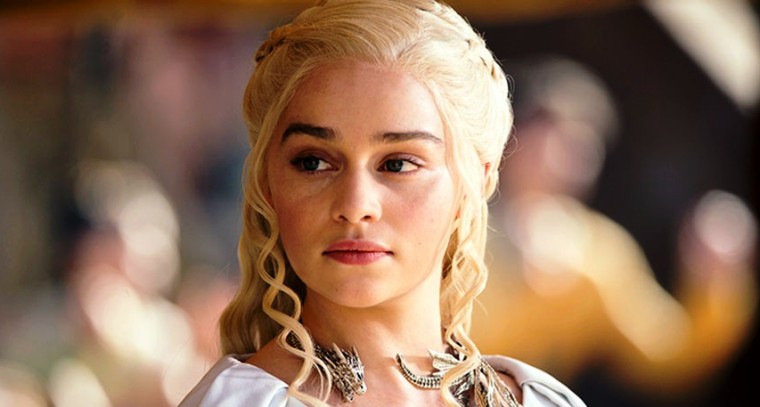
Arguably one of the hottest stars on one of the hottest television series, Emilia Clarke discusses the past, present and future of Game of Thrones.
On a recent Monday afternoon, the queen was taking her tea. “Could I just be more English than sense itself and get an Earl Grey?” asks Clarke from the deep folds of a leather chesterfield sofa in the so-called Drawing Room of her downtown Manhattan hotel. The young waiter is only too happy to oblige, though it’s unclear whether he knows he’s in the presence of the Khaleesi, Mother of Dragons and rightful ruler of the Seven Kingdoms.
That being said, six seasons into HBO’s Game of Thrones – a cultural phenomenon that plays in no fewer than 170 countries, has inspired countless tattoos and baby namings, and has proved to be the network’s most popular show of all time, with a seventh season set to premiere July 16th – it’s more than likely that he does. Clarke smiles and tucks her feet up under her. “I’m crap at getting recognized,” she confides. “People are like, ‘Oh, hey!’ And I’m like” – she starts yelling – “‘God! Oh, hi! I’m sorry!’ ”
When I first met Clarke, back in 2013, the actress was 26, still relatively unknown when not wearing her signature GoT blond wig, and not likely to compare herself to her warrior-queen character. She’d still seemed slightly in awe of the fact that she’d gotten the job at all, which was only her third acting role ever. “I’m all too painfully aware of how quickly this can disappear,” she’d told me when we’d met in a Broadway dressing room, where she was rehearsing to play Holly Golightly in Breakfast at Tiffany’s.
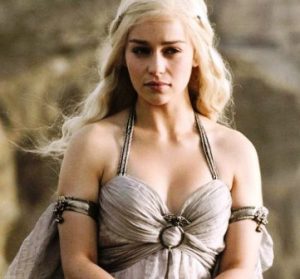 Four years later, Clarke has maintained her hallmarks – wry humor and ample good will, among them – but it’s clear we’re in another realm. Even in a messy bun and frayed blue jeans, she now comes across as a sort of beacon – poised, almost glowing, a point to which all other attention can’t help but be drawn. In other words, she has a way of commanding the room that seems downright Khaleesi-esque. She has, after all, now spent the bulk of her adult life embodying one of our culture’s most striking images of female domination, while eloquently explaining her onscreen nudity in broadly feminist terms. She’s turned 30 (of which she says, “I was just quietly panicking”). She’s graced the big screen multiple times, including opposite Arnold Schwarzenegger in Terminator Genisys. And, like the rest of us, she’s lived through Brexit and the ascendency of Trump, or, as she puts it, “ ’16. The fucking year where everything shit happened.” So, times have changed – for better and for worse.
Four years later, Clarke has maintained her hallmarks – wry humor and ample good will, among them – but it’s clear we’re in another realm. Even in a messy bun and frayed blue jeans, she now comes across as a sort of beacon – poised, almost glowing, a point to which all other attention can’t help but be drawn. In other words, she has a way of commanding the room that seems downright Khaleesi-esque. She has, after all, now spent the bulk of her adult life embodying one of our culture’s most striking images of female domination, while eloquently explaining her onscreen nudity in broadly feminist terms. She’s turned 30 (of which she says, “I was just quietly panicking”). She’s graced the big screen multiple times, including opposite Arnold Schwarzenegger in Terminator Genisys. And, like the rest of us, she’s lived through Brexit and the ascendency of Trump, or, as she puts it, “ ’16. The fucking year where everything shit happened.” So, times have changed – for better and for worse.
“You can’t expect everyone to just stop doing their jobs and march every day of their lives,” she says of the volatile political climate. “But we’ve got to be in this shit for the long game.” And for Clarke, being “in this shit” means not being OK with a lot of what goes on around her – a realization that grew and amplified “in a [post-Brexit] era where you suddenly go, ‘What do you mean my views are so vastly different from my neighbor?’ ”Like, for example, her views on being one of the few women on any given set. Or the fact that women consistently have fewer lines than their male counterparts, even when they’re playing the “lead.” Or that actresses must arrive for hair and makeup hours before most of the male stars.
“I feel so naive for saying it, but it’s like dealing with racism,” she says. “You’re aware of it, and you’re aware of it, but one day, you go, ‘Oh, my God, it’s everywhere!’ Like you suddenly wake up to it and you go, ‘Wait a fucking second, are you . . . are you treating me different because I’ve got a pair of tits? Is that actually happening?’ It took me a really long time to see that I do get treated differently. But I look around, and that’s my daily life.”
She recognizes, of course, that this is a complicated stance to take as a woman who has no doubt benefited hugely from her, ahem, pair of tits. She was Esquire’s Sexiest Woman Alive in 2015 (“My mum bribed them”), and her role on Game of Thrones has been punctuated by momentous scenes in which she happened to be naked. “It doesn’t stop me from being a feminist,” she counters. “Like, guess what? Yes, I’ve got mascara on, and I also have a high IQ, so those two things can be one and the same.” But the complexity of gaining women’s-empowerment cred through such channels explains why she’s also glad about the evolution of her character, a woman who rose literally from the ashes and now seems poised to win the game of thrones. Throughout history, Clarke reminds me, “Women have been great rulers. And then for that to be a character that I’m known to play? That’s so fucking lucky. Anyone who seems to think that it’s not needed need only look at the political environment we’re all living in to be like, ‘Oh, no, it’s needed. It is needed.’ ”
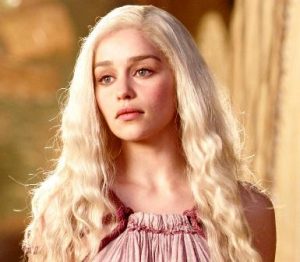 All of which means that Clarke is now embracing her character’s power in a way that might not have been possible for her when the series first aired, when the dew of Oxfordshire was still fresh upon her. Clarke grew up about an hour outside London in the tweedy British countryside of meat pies and bovine creatures. “You know, I grew up with a stream in the garden and with fields everywhere,” she says. “We used to go mushroom-picking. There were ducks. It was idyllic on every level.” She followed her older brother to St. Edward’s, a private boarding school in Oxford where, as the daughter of a sound designer (who’d started out as a roadie) and a marketing VP (who’d started out at secretarial college), she was somewhat removed from the upper-crust kids of her new milieu. “It was a fancy school,” she says. “And we weren’t that fancy.” She was also an artsy kid at a school that wasn’t that artsy. “People were good at hockey and wanted to be lawyers. I just wanted to be everyone’s friend,” she says. “It was painful – I was on the outskirts, peeping in, going, ‘You guys look fun. Can I come join?’ ”
All of which means that Clarke is now embracing her character’s power in a way that might not have been possible for her when the series first aired, when the dew of Oxfordshire was still fresh upon her. Clarke grew up about an hour outside London in the tweedy British countryside of meat pies and bovine creatures. “You know, I grew up with a stream in the garden and with fields everywhere,” she says. “We used to go mushroom-picking. There were ducks. It was idyllic on every level.” She followed her older brother to St. Edward’s, a private boarding school in Oxford where, as the daughter of a sound designer (who’d started out as a roadie) and a marketing VP (who’d started out at secretarial college), she was somewhat removed from the upper-crust kids of her new milieu. “It was a fancy school,” she says. “And we weren’t that fancy.” She was also an artsy kid at a school that wasn’t that artsy. “People were good at hockey and wanted to be lawyers. I just wanted to be everyone’s friend,” she says. “It was painful – I was on the outskirts, peeping in, going, ‘You guys look fun. Can I come join?’ ”
After graduation, she applied to RADA, LAMDA and Guildhall, a trifecta of hallowed institutions for British would-be actors, and got rejected from every one. She waitressed, saved up some money, went backpacking around Southeast Asia and India, and then reapplied to “a bajillion schools,” only getting into the Drama Centre London “by the skin of my teeth when I got a phone call saying, ‘This girl broke her leg. The place is free if you want it.’ ”
Drama school was another venue where she learned her place. She was never the favorite. She was never the ingénue. She played old ladies and bedraggled prostitutes. “They broke us down,” she tells me. “But if you’re a favorite at school, you’re fucked for life. I mean, you come out and you’re like, ‘Hey, where’s my golden egg?’ Whereas when you haven’t had that at all, you’re just like, ‘I will do anything. I will work harder than you could imagine.’ ” She gave herself a year to break into the industry. Right around that deadline, cash-strapped, despairing and casting about for alternative life plans, Clarke – just scraping five feet two, curvy and brunette – got a call from her agents about auditioning for the role of tall, willowy, blond Daenerys Targaryen. She turned to Google for a crash course on George R.R. Martin’s novels and then went in to meet the HBO execs. At some point in the audition, she found herself doing the funky chicken.
“You wake up and go, ‘Wait a fucking second, are you treating me different because I’ve got a pair of tits'”
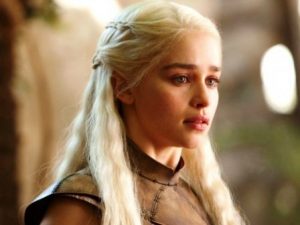 She also managed to broadcast the range HBO was seeking: Clarke had the vulnerability of someone who wasn’t the favorite but also the strength of a young woman who’d grown up with a working mother who had herself risen out of secretarial school to forge a high-powered career. “I was so lucky that I was brought up with a mum who just showed by example,” Clarke says. “It was never spelt out that I would have a harder time in life. My family put a fair amount of onus on wanting to expand your thinking as opposed to shrinking your bottom.”
She also managed to broadcast the range HBO was seeking: Clarke had the vulnerability of someone who wasn’t the favorite but also the strength of a young woman who’d grown up with a working mother who had herself risen out of secretarial school to forge a high-powered career. “I was so lucky that I was brought up with a mum who just showed by example,” Clarke says. “It was never spelt out that I would have a harder time in life. My family put a fair amount of onus on wanting to expand your thinking as opposed to shrinking your bottom.”
This goes a long way toward explaining the more personal reason why 2016 was a shitty year for Clarke. On July 10th, her father – whose behind-the-scenes work got her interested in acting in the first place – passed away from cancer. Clarke was filming a movie in Kentucky and unable to be home for all of his final days. When things got dire, she wrapped the movie early but arrived at the airport in London to learn that she’d just missed him. “I definitely think I’m still in varying degrees of shock,” she says. “There’s no measure for it. There are all of these books about grief, but there’s no guide. Like, ‘Oh, on Tuesday, you’ll feel this, but on Thursday, you’ll be here.’ ”
Three weeks after her father’s death, Clarke began filming the seventh season of Game of Thrones. A few weeks before it, Brexit had happened. “The world felt like a scarier place once my dad wasn’t in it,” she says. “And then those two things happening in quick succession threw me off balance and made me re-evaluate who I am. And it was in that re-evaluation that I was like, ‘I’m a fucking woman, and there aren’t very many of us performing in the environment that I’m performing in. I need to be incredibly sure of the ground on which I’m standing, and I need to take ownership of the choices I’m making.’ ”
That included the way she comported herself on set. Clarke’s general approach to the world is self-deprecating levity. “When one spends your days discussing the politics of King’s Landing, it’s very important not to forget to do your penguin dance between takes,” co-star Peter Dinklage says of her capacity for goofing around, while she describes what goes through her mind when acting opposite a mechanical dragon thusly: “I’m like, ‘Is he clenching? Is he farting? What do you want me to do?’ ”
But over the course of the show, Clarke’s own vulnerability has shrunk as Khaleesi’s power has expanded. “You don’t get to be a mother of dragons without a change or two,” she says. “Being able to encompass and understand the kind of woman who could conquer armies and topple societies allows me, the actor, to stand firmly in those shoes.”
Which came in handy on set when something would remind her of her father and literally “take my breath away,” she says. “You underestimate the enormity of it. I didn’t know feeling this way was possible.” In those moments, she’d gather her strength and try to channel that emotion into her work. “I was like, ‘I’m not gonna let you see me cry.
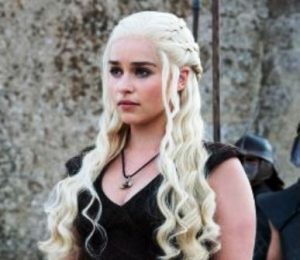 That ain’t happening.’ ”Instead, she’d steal away for a moment and then come back to being Khaleesi.
That ain’t happening.’ ”Instead, she’d steal away for a moment and then come back to being Khaleesi.
For Clarke, Khaleesi’s story is about to come to a close. Sometime next year, the final episode of Game of Thrones will air and the role that she’s been playing for almost a decade, the role that “saved my ass in so many ways – propelled my ass, really,” will be over. “There’s going to be a shake-up of my identity, I think,” she says of that inevitability. “And I feel like I’m only going to understand what the last seven years has been when we stop.”
She promises the upcoming episodes of the epic will not disappoint. “Spoiler alert – I normally don’t spend very much time in Belfast, but this last season I spent a little more time there,” she says, throwing a hint to the GoT obsessives. “It’s a really interesting season in terms of some loose ends that have been tied, some really satisfying plot points, some things where you’re like, ‘Oh, my God. I forgot about that!’ Rumors are going to be confirmed or denied.” But Khaleesi’s plotline will continue through to the end. “I mean, I have no doubt there’ll be prequels and sequels and who knows what else.
But I am doing one more season. And then that’ll be it.”
After that eighth and final season, Clarke will have a freedom that she hasn’t had since she was cast at age 23. The roughly seven months of each year she’s spent waking up at 3 a.m. to get into hair and makeup, the 18-hour days in which she’s pretended to ride a dragon or lead an army or walk naked through fire, will suddenly be hers again. The thought is both daunting and titillating. “It makes me emotional to think about,” she says. “It’s my beginning, middle and end – the single thing that has changed me most as an adult.”
Not that freedom is here yet. When she returns to London in a few days, it will be for the Han Solo Star Wars prequel, in which she presumably plays yet another bad-ass woman. “All I can say is that she’s awesome,” Clarke tells me. “Like, legit, that’s all I can actually get away with saying. There’s a stormtrooper with a gun, and he’s going to come walking in any second.”
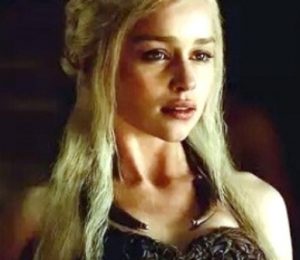 After Star Wars, Clarke’s ultimate goal is to create the kind of shop that rights the wrongs she’s witnessed: “I would love to start a production company that was just full of nice, funny women,” and where the vibe was one of “‘Yeah, I’ve got a pair of tits, and aren’t they lovely? Aren’t they great? You do too! They’re great, you’re in the club!’ ”In the meantime, she says, she’s been working on expanding her mind rather than shrinking her bottom.
After Star Wars, Clarke’s ultimate goal is to create the kind of shop that rights the wrongs she’s witnessed: “I would love to start a production company that was just full of nice, funny women,” and where the vibe was one of “‘Yeah, I’ve got a pair of tits, and aren’t they lovely? Aren’t they great? You do too! They’re great, you’re in the club!’ ”In the meantime, she says, she’s been working on expanding her mind rather than shrinking her bottom.
“I’ve suddenly got a ferocious need to learn things,” she adds. “Like, I listen to podcasts manically – The New York Times and The Guardian and The Economist and TED Talks and Fresh Air. I need information. I’m like, ‘I just want to know as much as humanly possible.’ ”Which means that for all Khaleesi has given Clarke, Clarke’s in the process of reciprocating. “Khaleesi got a little something extra this year, you know what I mean? She got a little something else going on.”
Source: RollingStone.com




















Leave a Comment